|
|
|
Sort Order |
|
|
|
Items / Page
|
|
|
|
|
|
|
| Srl | Item |
| 1 |
ID:
155166
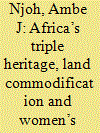

|
|
|
|
|
| Summary/Abstract |
Women have less access to land than men in Africa. Previous analyses have typically identified African indigenous culture as the problem’s exclusive source. With Cameroon, Kenya and Sierra Leone as empirical referents, an alternative explanation is advanced. Here, the problem is characterized as a product of Africa’s triple heritage, comprising three main cultures, viz., African indigenous tradition, European/Christianity and Arabia/Islam. The following is noted as a major impediment to women’s access to, and control of, land: the supplanting of previously collective land tenure systems based on family or clan membership by ‘ability-to-pay’ as the principal determinant of access to land.
|
|
|
|
|
|
|
|
|
|
|
|
|
|
|
|
| 2 |
ID:
166686
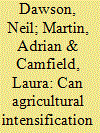

|
|
|
|
|
| Summary/Abstract |
Market-oriented agricultural intensification is a major development strategy, yet its alignment with sustainable development goals (SDGs) is unclear. We apply indicators for SDG 2 (eradicate hunger) regarding income, food production, food security and land tenure to recent intensifications in Rwanda and Laos to reveal their disaggregated impacts. We find while market-oriented intensification may generate poverty reduction, it also exacerbated marginalisation and poverty through various forms of land tenure insecurity. Ethnicity and gender were influential factors in Rwanda, and post-conflict resettlement policies in Laos. We discuss implications for development practice and selection of suitable indicators to reflect the ambition of the SDGs.
|
|
|
|
|
|
|
|
|
|
|
|
|
|
|
|
| 3 |
ID:
127083
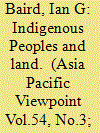

|
|
|
|
|
| Publication |
2013.
|
| Summary/Abstract |
In 2001 a new Land Law was adopted in Cambodia. It was significant because - for the first time - it recognised a new legal category of people, 'Indigenous Peoples' or chuncheat daoem pheak tech in Khmer, and it also introduced the legal concept of communal land rights to Cambodia. Indigenous Peoples are not mentioned in the 1993 constitution of Cambodia or any legislation pre-dating the 2001 Land Law. However, Cambodia's 2002 Forestry Law also followed the trend by recognising 'Indigenous Peoples'. These laws have been both symbolically and practically important, as they have provided government-mandated legitimacy to Indigenous identities and associated land and forest rights, including communal land rights, and have been ontologically significant in dividing Indigenous and non-Indigenous Peoples on legal grounds. Over a decade after the 2001 Land Law was promulgated, this article considers some aspects of its effects. In particular, when compared with the potential for developing communal land rights in Laos, one has to wonder how advantageous it is to adopt Indigenous identities and the types of communal land rights and community forestry rights presently possible in Cambodia.
|
|
|
|
|
|
|
|
|
|
|
|
|
|
|
|
| 4 |
ID:
073385
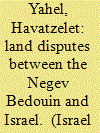

|
|
|
|
|
| Publication |
2006.
|
| Summary/Abstract |
The conflict between the State of Israel and the Negev Bedouin over land is not new; State vs. nomadic land ownership is an on-going dispute originating as early as the Ottoman Empire. Illegal construction and land use are its widespread expressions, making it difficult for the State to supply basic needs to its citizens. Furthermore, the dispute creates obstacles to the development of the Negev for the benefit of all its inhabitants. This article will try to lay out the Government's approach, as the author perceives it, to the resolution of the land dispute, through reaching financial settlements with various Bedouin individuals and tribes. Monetary and land compensation have both been offered, along with the revival of the Land Title Settlement procedure, as part of a new Government policy.
|
|
|
|
|
|
|
|
|
|
|
|
|
|
|
|
| 5 |
ID:
109125
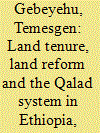

|
|
|
|
|
| Publication |
2011.
|
| Summary/Abstract |
Ethiopia has been both enriched and burdened by its past, including its land tenure system. 'Land to the Tiller' was one of the main factors for the decline and fall of the imperial period, the reign of Emperor Haile-Sellase (1941-1974). This study is essentially based on archival materials from the Wolde-Mesqel Research Center at the Institute of Ethiopian Studies, Addis Ababa University. I consulted material from the Center that deal with the subject of this article. The article examines the essential features and elements of land reform, land tenure and the qalad system (land measurement) in Ethiopia. It also tries to analyze the factors that made land measurement and land reform complex and difficult during Imperial Ethiopia. The findings suggest that most of the available literature on the government of Haile-Sellase's land tenure system lacks a sense of critical scholarship, and needs to be more comprehensive and balanced in its judgements and interpretations. It has no depth or objectivity and seems to have been written for political consumption. This article concludes by giving a comparative and contrastive analysis of some of the existing literature on land tenure, reform and measurement, using the archival materials of the Research Center.
|
|
|
|
|
|
|
|
|
|
|
|
|
|
|
|
| 6 |
ID:
147459
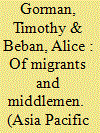

|
|
|
|
|
| Summary/Abstract |
In a possible sign of a new trend in Southeast Asia, economic pressures are driving smallholder shrimp farmers from Vietnam's Mekong Delta across the Cambodian border in search of new land. Building from ethnographic research with Vietnamese shrimp farmers in Kampot province, Cambodia, this paper explores the structures, mechanisms and relations that facilitate and impede the ability of Vietnamese migrants to gain and maintain access to land in Cambodia. The Vietnamese migrants in our study bring capital and farming skills, but their ambiguous legal status and their lack of social networks and experience with the terms of access in Cambodia render them vulnerable to exclusion and dependent on a local broker to mediate their interactions with landowners and authorities. We recount the migrants' attempts to overcome the uncertainty of their mediated access by bypassing the broker and cultivating direct social ties with Khmer villagers, border authorities and the landowners themselves. This study generates new insights into the dynamics of cross-border livelihoods in mainland Southeast Asia and more broadly illuminates the central importance of migrant–broker relationships and migrant agency in seeking to overcome dependency on brokers by forging new social relations in border areas.
|
|
|
|
|
|
|
|
|
|
|
|
|
|
|
|
| 7 |
ID:
106698
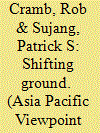

|
|
|
| 8 |
ID:
161264
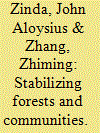

|
|
|
|
|
| Summary/Abstract |
China's recent collective forest tenure reform is intended to clarify and certify forest rights, and thereby promote market circulation of forestland, encourage forestry production and safeguard conservation. Central policy statements prioritize parcelling tenure among households to promote efficient management. This study examines how participants experienced the programme in communities in north-west Yunnan. In the study area, rather than individualizing tenure, forestry agencies compelled communities to re-collectivize forests. Nonetheless, residents persist in using household forests despite restrictions. Local officials tacitly sanction these activities. In mountain hinterlands, forest tenure reform has been focused on “stabilizing” forests and communities. Rather than forcibly impose tenure designs, authorities perform what we call accommodative buffering. A set of formal institutions, rules and mappings enables projects like forest ecological compensation payments to go forward. However, state agents at local and higher levels tolerate informal practices that contain the trouble that poorly fitted formal institutions might cause. While potentially more resilient than by-the-book enforcement, these arrangements could leave residents vulnerable to political shifts that require a demonstration of policy adherence.
|
|
|
|
|
|
|
|
|
|
|
|
|
|
|
|
| 9 |
ID:
079749


|
|
|
|
|
| Publication |
New York, Nova Science Publishers, 2007.
|
| Description |
xiv, 299p.
|
| Standard Number |
9781600214455
|
|
|
|
|
|
|
|
|
|
|
|
Copies: C:1/I:0,R:0,Q:0
Circulation
| Accession# | Call# | Current Location | Status | Policy | Location |
| 052877 | 320.12/GUO 052877 | Main | On Shelf | General | |
|
|
|
|
| 10 |
ID:
157945
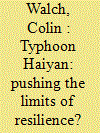

|
|
|
|
|
| Summary/Abstract |
Disaster risk reduction has been an important priority in the Philippines for the last twenty years. Yet Typhoon Haiyan still resulted in at least 6000 deaths and affected more than 14 million people. Why was this the case in a country supposedly well equipped to respond to natural disasters? While there are several explanations, including the sheer scale of this typhoon, corruption, and implementation challenges, this paper focuses on growing social and economic inequalities. This paper argues that the resilience discourse and framework at the national level do not translate into programs that help lift people out of poverty, particularly landless people. This is because state-led resilience policies focus on technical aspects of recovery rather than the root cause of vulnerabilities, explaining to some extent the high level of casualties in the wake of typhoon Haiyan. Evidence supporting this argument is drawn from more than forty interviews between 2013 and 2015 with disaster victims and professionals involved in resilience building.
|
|
|
|
|
|
|
|
|
|
|
|
|
|
|
|
| 11 |
ID:
132406
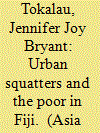

|
|
|
|
|
| Publication |
2014.
|
| Summary/Abstract |
Pacific land issues are not only about Indigenous ownership in rural areas. Within urban areas in particular, land historically alienated into State control produced consequences only now being realised. In Fiji, all State land is claimed by communal landowners and such claims were said to be one reason for the 2006 coup. It has been suggested in recent times that urban informal settlements on the qoliqoli (coastal and foreshore land) are at risk and face increasing challenges from landowners. This paper examines a neglected area of urban State land in Fiji and comments on the future of the urban poor in Fiji if land tenure is unresolved.
|
|
|
|
|
|
|
|
|
|
|
|
|
|
|
|
|
|
|
|
|